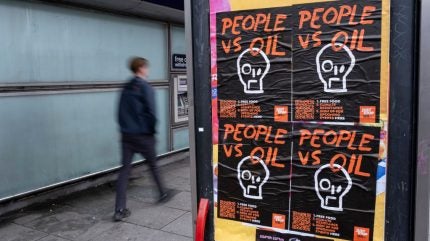
The world’s largest oil majors are not adequately prepared for the energy transition, finds a report released today by the think tank Carbon Tracker. The report assesses the compatibility of the upstream portfolios of 25 of the world’s largest oil and gas companies against the goals of the Paris Agreement, giving them a grade from A–H, where A is “potentially aligned” with Paris goals, and H is the furthest from being aligned, reflecting company strategy more consistent with a 2.4°C outcome “or worse”.
The highest scoring company is British company BP, which earns a D grade, while its peer, Shell, is in sixth place, with an E grade.
Carbon Tracker scores the companies across five metrics: future investment options, which assesses a company’s competitiveness via the duration risk of current productive assets and carries a 30% weight in the scoring; recent sanctions, referring to recently approved projects (10%); how far their production plans are Paris-aligned (30%); the strength of any emissions targets (20%); and finally, the prevalence of production growth targets in executive remuneration policies (10%).
Almost all the companies in the report’s assessment are targeting new developments and production increases in the near-term. However, in the longer-term, Repsol, Equinor and Shell are aiming to keep production volumes flat, while bp, which comes out with the highest grade, is planning for a decline.
These moves “could be a sign that companies are recognising that demand for their core products is unlikely to increase”, the think tank notes, adding that “such views are in the minority across the industry”, as many companies are targeting significant increases in total volumes.
Carbon Tracker argues that declining demand for hydrocarbons will likely imply lower future prices, which producers should “duly incorporate into their strategic decision-making”.
How well do you really know your competitors?
Access the most comprehensive Company Profiles on the market, powered by GlobalData. Save hours of research. Gain competitive edge.

Thank you!
Your download email will arrive shortly
Not ready to buy yet? Download a free sample
We are confident about the unique quality of our Company Profiles. However, we want you to make the most beneficial decision for your business, so we offer a free sample that you can download by submitting the below form
By GlobalDataIt warns potential investors in the companies that “near-term overinvestment could have a significant impact on a company’s future cash flow generation”, meaning producers with lower-cost portfolios that adequately prepare for declining demand are likely to be more financially resilient should prices fall in the future.
Of the oil majors it assesses, Eni and Equinor are found to have the least risky portfolios, whereas ConocoPhillips, Occidental and ExxonMobil are “relatively more exposed”.
In the report, National Oil Companies perform better, reflecting their more cost-competitive portfolios comprised of largely conventional projects.
In a separate Carbon Tracker report published late last year, the think tank notes that oil and gas producers have a handful of future options going forward to avoid stranded asset risk, which can broadly be categorised as: pursuing a strategy of natural depletion, by calling a halt to new developments; adopting a “managed investment” strategy that focuses on short-cycle projects (a strategy “at least partially adopted” by European oil majors including Eni and Shell); and finally, pursuing “business-as-usual replacement” or even production growth.
The think tank recommends that investors seeking “improved alignment of performance” should engage companies on the disclosure of long-term production plans alongside investments; key project sanctions that are not aligned with Paris; plus their emissions targets, which should be backed up by credible methods to achieve them. Finally, they should ensure that executive remuneration policies do not reward CEOs for growing production.






